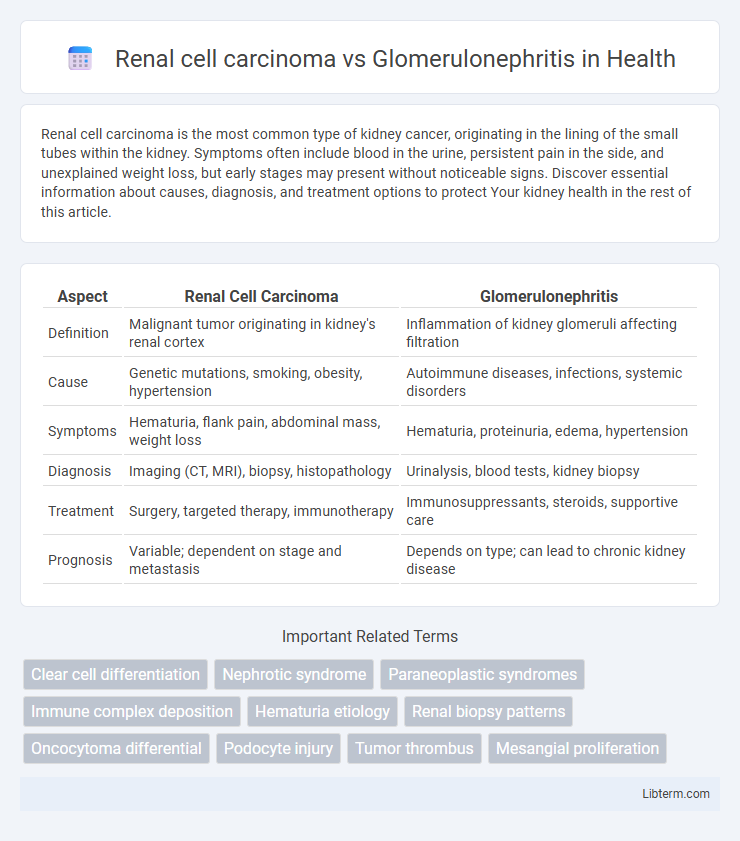Renal cell carcinoma is the most common type of kidney cancer, originating in the lining of the small tubes within the kidney. Symptoms often include blood in the urine, persistent pain in the side, and unexplained weight loss, but early stages may present without noticeable signs. Discover essential information about causes, diagnosis, and treatment options to protect Your kidney health in the rest of this article.
Table of Comparison
| Aspect | Renal Cell Carcinoma | Glomerulonephritis |
|---|---|---|
| Definition | Malignant tumor originating in kidney's renal cortex | Inflammation of kidney glomeruli affecting filtration |
| Cause | Genetic mutations, smoking, obesity, hypertension | Autoimmune diseases, infections, systemic disorders |
| Symptoms | Hematuria, flank pain, abdominal mass, weight loss | Hematuria, proteinuria, edema, hypertension |
| Diagnosis | Imaging (CT, MRI), biopsy, histopathology | Urinalysis, blood tests, kidney biopsy |
| Treatment | Surgery, targeted therapy, immunotherapy | Immunosuppressants, steroids, supportive care |
| Prognosis | Variable; dependent on stage and metastasis | Depends on type; can lead to chronic kidney disease |
Introduction: Overview of Renal Cell Carcinoma and Glomerulonephritis
Renal cell carcinoma (RCC) is a malignant tumor originating from the renal tubular epithelium and represents approximately 90% of all kidney cancers, characterized by clear cell, papillary, and chromophobe subtypes. Glomerulonephritis encompasses a group of immune-mediated inflammatory disorders affecting the glomeruli, leading to impaired kidney filtration and potential progression to chronic kidney disease. Both conditions impact kidney function but differ significantly in etiology, pathology, clinical presentation, and management approaches.
Epidemiology and Risk Factors
Renal cell carcinoma primarily affects adults aged 60-70 years, with higher incidence in males and risk factors including smoking, obesity, and hypertension. In contrast, glomerulonephritis often presents across all age groups, linked to autoimmune disorders, infections, and genetic predispositions. Epidemiological data reveal renal cell carcinoma has a global incidence of approximately 2-3%, whereas glomerulonephritis prevalence varies widely depending on specific subtypes and geographic regions.
Pathophysiology: Tumor versus Inflammatory Processes
Renal cell carcinoma (RCC) arises from the malignant transformation of proximal renal tubular epithelial cells, involving genetic mutations such as VHL gene inactivation leading to uncontrolled cellular proliferation and angiogenesis. In contrast, glomerulonephritis is characterized by inflammatory processes targeting the glomeruli, often mediated by immune complex deposition, complement activation, and infiltration of inflammatory cells causing glomerular injury. The fundamental pathophysiological difference lies in RCC's neoplastic growth driven by oncogenic pathways versus glomerulonephritis's immune-mediated inflammation causing structural and functional glomerular damage.
Clinical Presentation: Signs and Symptoms
Renal cell carcinoma typically presents with hematuria, flank pain, and a palpable abdominal mass, often accompanied by weight loss and fever in advanced stages. Glomerulonephritis commonly manifests as edema, hypertension, hematuria with red blood cell casts, and proteinuria, reflecting kidney inflammation and impaired filtration. Both conditions may cause impaired renal function but differ significantly in symptom onset and associated systemic features.
Diagnostic Approaches: Imaging and Laboratory Tests
Renal cell carcinoma diagnosis primarily relies on imaging techniques such as contrast-enhanced CT scans and MRI to identify renal masses and assess tumor involvement. In contrast, glomerulonephritis diagnosis depends heavily on laboratory tests like urinalysis revealing hematuria and proteinuria, serological markers for autoimmune conditions, and renal biopsy for histopathological confirmation. While imaging excludes structural abnormalities in glomerulonephritis, renal cell carcinoma requires detailed imaging to guide surgical planning.
Histopathological Differences
Renal cell carcinoma (RCC) histopathology reveals malignant epithelial cells with clear cytoplasm, arranged in nests or tubules, often bordered by a rich vascular network, contrasting sharply with glomerulonephritis, which shows inflammatory cell infiltration, mesangial proliferation, and immune complex deposition within glomeruli. RCC typically exhibits cellular atypia, prominent nucleoli, and necrosis, whereas glomerulonephritis manifests as glomerular basement membrane thickening, crescent formation, or segmental sclerosis without true neoplastic features. Immunohistochemical staining in RCC highlights markers such as PAX8 and CA-IX, while glomerulonephritis is characterized by immunoglobulin and complement deposits observable via immunofluorescence microscopy.
Treatment Modalities: Surgery, Immunotherapy, and Immunosuppression
Renal cell carcinoma treatment primarily involves surgical options such as partial or radical nephrectomy, often combined with immunotherapy agents like immune checkpoint inhibitors to target metastatic disease. In contrast, glomerulonephritis management centers on immunosuppression with corticosteroids or cytotoxic drugs to reduce inflammation and preserve kidney function, avoiding surgery unless complications arise. Understanding the distinct therapeutic strategies for renal cell carcinoma and glomerulonephritis is crucial for optimizing patient outcomes based on pathology and disease progression.
Prognostic Factors and Outcomes
Renal cell carcinoma (RCC) prognosis depends heavily on tumor stage, grade, and histological subtype, with localized tumors showing better survival rates compared to metastatic cases where 5-year survival drops below 15%. In contrast, glomerulonephritis prognosis varies by etiology and severity, with factors such as degree of proteinuria, renal function at diagnosis, and presence of chronic kidney disease influencing long-term outcomes. While RCC outcomes center on oncological control through surgery or targeted therapy, glomerulonephritis management aims to preserve renal function and prevent progression to end-stage renal disease.
Complications and Long-term Management
Renal cell carcinoma complications primarily include metastasis to lungs, bones, and liver, while long-term management focuses on targeted therapies and regular imaging surveillance to monitor tumor progression. Glomerulonephritis complications commonly involve chronic kidney disease and progression to end-stage renal disease, necessitating immunosuppressive therapy and dialysis or transplantation as part of long-term management. Effective management strategies require precise differentiation between these conditions for optimal patient outcomes and tailored therapeutic approaches.
Preventive Strategies and Patient Education
Preventive strategies for renal cell carcinoma emphasize minimizing exposure to risk factors such as smoking cessation, maintaining a healthy body weight, and controlling hypertension. Glomerulonephritis prevention focuses on managing infections promptly, monitoring autoimmune conditions, and avoiding nephrotoxic drugs. Patient education should highlight lifestyle modifications, regular screening for high-risk groups, and adherence to prescribed treatments to reduce disease progression and complications.
Renal cell carcinoma Infographic

 libterm.com
libterm.com